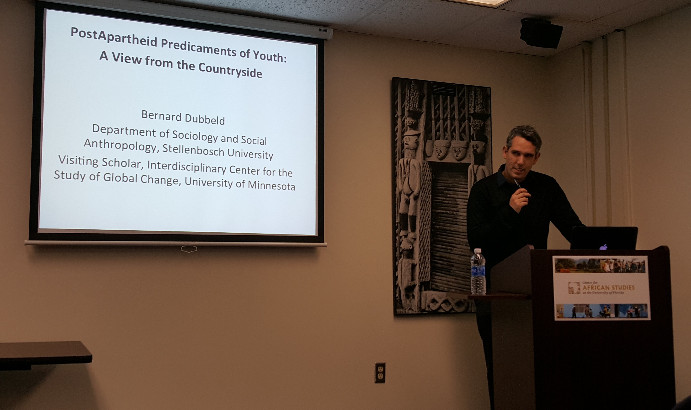On Friday December 9th, Dr. Bernard Dubbeld gave a Baraza talk titled, “PostApartheid Predicaments of Youth: A View from the Countryside.” Dr. Dubbeld is a Senior Lecturer in the Department of Sociology and Social Anthropology in Stellenbosch University. Currently he is also a Visiting Scholar at the Interdisciplinary Center for the Study of Global Change at the University of Minnesota. Dubbeld’s talk focused on the experience of youth in the countryside, using 4 vignettes of individuals’ experiences in Glendale, a town in the KwaZulu-Natal Province of South Africa.
Dubbeld opened his talk contextualizing the state of frustration, and particularly youth frustration, in the failures of the ANC to implement the idealized post-apartheid government reforms promised by Mandela and subsequent leaders. This persistent and perhaps increasing frustration has resulted in particular highs of politicized organization in the #RhodesMustFall and #FeesMustFall movements at South Africa’s universities. In some ways, Dubbeld’s research seeks to connect the expression of frustration in urban areas to rural or countryside settings where youth livelihoods and futures are very much in question.

Through the presentation of 4 vignettes of one primary family member from different households, the resulting stories highlight themes of diminishing economic opportunity, conflicts between youth frustration and respect for tradition, and youth absconding from cultural norms (via (1) young men who are absent from homes and reject traditions of supporting both elders and female partners and (2) via young women who accept advances from these ‘irresponsible’ young men). The government has supported some basic levels of infrastructure in Glendale via the building of RDP (Reconstruction and Development Programme) houses. Yet the construction of sustainable infrastructure and particularly mechanisms which creates employment are missing. Women with children in Glendale largely rely on government-issued child support grants, whereas young men, without government support and few job prospects, feel forced to leave for the cities to economically empower themselves. Thus Glendale is largely populated by young women and children as well as elders, both of which may or may not receive financial support from increasingly absent male youth who have left to find work elsewhere.